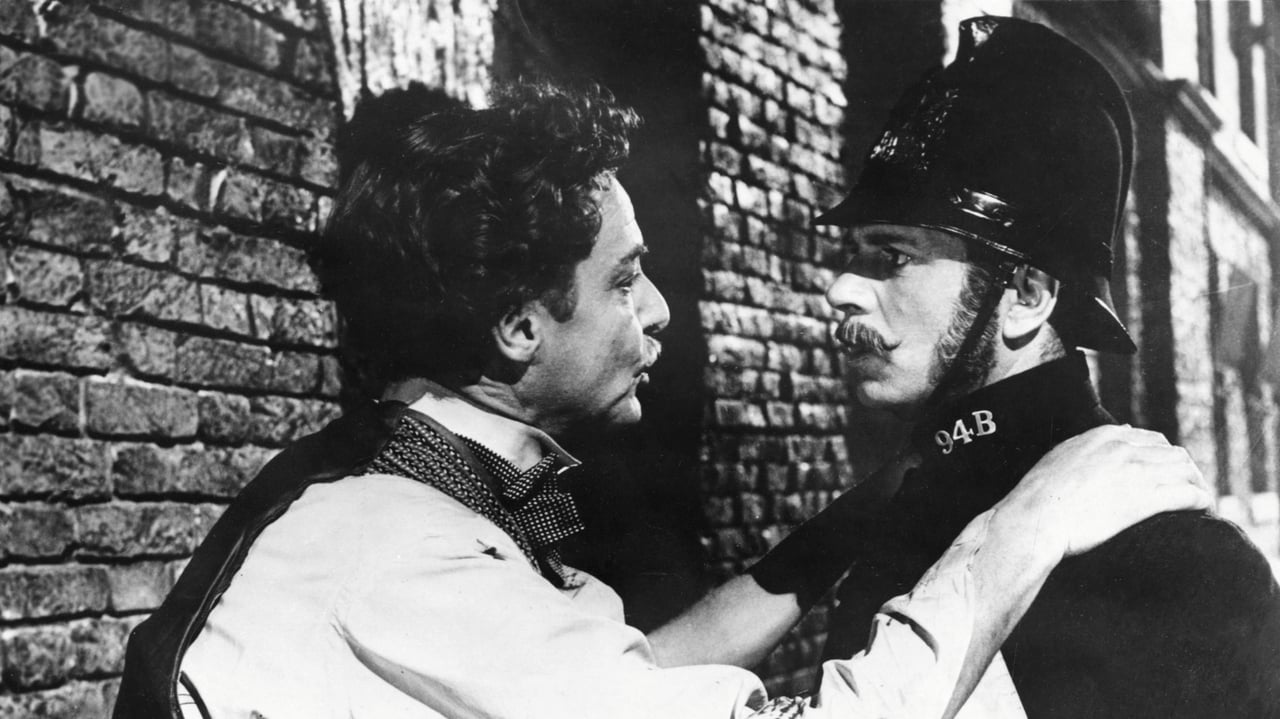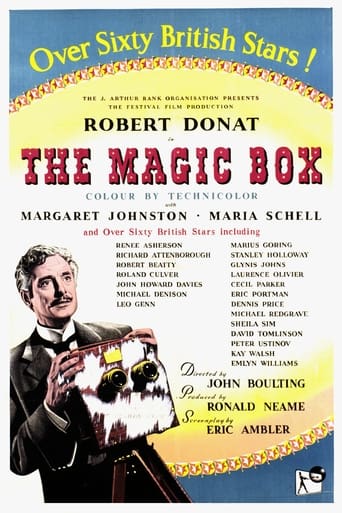

Released to commemorate the Festival of Britain, this is a fairly entertaining, if heavily fictionalised and romanticised, account of the British cinematography pioneer William Friese-Greene, who is nowhere near as well remembered as his more successful contemporaries Thomas Edison, the Lumière brothers and the true inventor of cinematography Louis Le Prince. Rather appropriately given the subject, the film has beautiful colour cinematography and it is well directed by John Boulting but the script is not as strong as it could be as it is not very well paced. I did not really see the point in telling the film out of chronological order. It begins with his second wife Edith recounting their troubled marriage before the elderly Friese-Greene recollects his early career and his life with his more supportive first wife Helena.The always effortlessly charming and charismatic Robert Donat is excellent in the role of Friese-Greene, a good and well-meaning man whose obsession with perfecting moving pictures leads him to neglect his family though not out of any malice. His performance is without a doubt the highlight of the film. After him, the strongest cast member is Maria Schell as Helena. Margaret Johnston is quite good as Edith in her more sedate scenes but goes badly over the top during the character's emotional breakdown. The film is notable for featuring many great British actors in cameo roles: Richard Attenborough, Laurence Olivier, Peter Ustinov, Michael Hordern, Michael Denison, Michael Redgrave, Thora Hird, William Hartnell, Sid James, Joyce Grenfell, Marius Goring, Stanley Holloway, Kay Walsh, Joan Hickson, Glynis Johns, Miles Malleson, etc. I was very glad to finally see Attenborough's wife Sheila Sim in a film, having seen her husband and her brother Gerald in so many recently! Many of the actors in the film later turned up in films that Attenborough directed, incidentally.The best scene in the film is the very funny one in which Friese-Greene tells a policeman, played by Olivier in probably the most normal, down-to-earth role of his very long and impressive career, that he has invented the motion picture but the way that he phrases it makes it sound as if he had committed a murder! The final scene in which Friese-Greene dies unrecognised and forgotten at a film conference is quite moving.Overall, this is a decent film but not a great one. If you want to watch a film about the 19th Century pioneer of a technology which we now take for granted, I would recommend the considerably better (and more historically accurate but still fictionalised) "The Story of Alexander Graham Bell" starring Don Ameche.
... View MoreThis film left me puzzled. What was the reason for the strange scene setup? Why not just present the movie in straight chronological order instead of telling the story by rather far-fetched flashbacks? The main story line is derived from a flashback that lasts for half the duration of the entire film! The story of film inventor Friese-Greene is told mainly from the viewpoint of his two successive wives, starting with his later wife. The film starts off when Friese-Greene is already approaching the end of his life when he visits his wife who has separated him. From then on, she begins to tell about the time she lived with him (when he already had put his invention into practice). By now, Friese-Greene was a bankrupt debtor who vainly tries to expand and innovate his cinematic ambitions and we see how he brings his family along with him in his downfall.The second part of the movie focuses on the start of his career as a photographer and his gradual success in creating the moving picture. This is the most intriguing part of the movie, where we witness the birth of a new era. However, it is regrettable that we already know what is going to come of our hero; this way all that we observe somehow leaves us with a bitter aftertaste. And it detracts from the overall 'suspense'.I guess that the main reason for this awkward order of life events is the fact that the interlude between the death of his first wife and his meeting his second is left undone. And this is unforgivable because this is also the period Friese-Greene brought his new invention to public attention. The recurring attention at his failed recognition lies in this period; also it would be nice to see how this totally new experience took place.What we are left with is a tolerable movie about a man who is blind with ambition and therefore also blind to the people who love him and the people who he is indebted to. The acting, camera work and soundtrack are all fine. As said, the major setback is the screenplay: deplorable.
... View MoreIn hindsight, I wonder why they chose to do a biography of William Friese-Greene. After all, on one hand, it isn't firmly established that he did create motion pictures (this can also be claimed by several others as well). In addition, his work with color cinematography (for which he is most famous) was mostly a failure. But most importantly, he was not a particularly nice person. He apparently was a bit of a Schizoid Personality or perhaps had Asperger's Syndrome--emotional disorders where an individual has extreme difficulty relating to or caring about others. He was so obsessed with his work, that according to the film he was a terrible father and husband. The bottom line is that THINGS were much more important to him than people. In other words, he was a jerk--at least as portrayed in the film.So what's left? Why watch the film if the man's inventions had limited impact and he was a pretty detached and self-absorbed individual?! No matter how well the film was made (and it was decent--but not outstanding even with this amazing cast), it was severely hampered at the onset. Overall, passable but that's all. At least it was filmed in color...just not using Friese-Greene's process.
... View MoreWhether or not William Friese-Greene was actually the father of motion pictures he was certainly in there trying. And though Edison and some French guys get a mention in passing this beautifully-mounted star-laden tribute to dogged endeavour is all Willie's show - made thirty years after his death and timed for the Festival of Britain. It almost missed the bus in this regard and wasn't generally released until the following year,something charmingly British about that. The film itself is charmingly British too, handling its huge cast and period detail with steady quietly-absorbing assurance. Eric Ambler's deftly-crafted script provides romance, comedy, poignancy and an absolutely splendid pinnacle-scene which sums the picture up both in terms of story and production-plan. His dual-flashback structure, which some find confusing, permits the masterly Robert Donat to re-wind from forgotten old codger to eager young whippersnapper and back again with a shift in the middle for 'changing reels' on the assertion of his second wife that "Willie was before my time". This second marriage assuaged his widower-loneliness and certainly produced quite a brood but was blighted by despondency - he's not mentioned in the Encyclopedia - and his ever-present financial incompetence which severs their union. It's the more distant past, the era of inspiration and achievement, which is the film's ultimate destination.The cameo stars fall to with aplomb - 'The Play's the Thing, what would you like us to do ?' There's the fun of the Living Statues, Margaret Rutherford at her most formidable, wiping the floor with Mr. Guttenberg, Joan Hickson's cute scene-stealing as the customer with the facial twitch, Muir Mathieson appearing on-screen for once conducting the Bath Choral Society while the only solo male vocalist is miles away chinwagging forgetfully with the inventor of photography. Eric Portman bulldozes through as Willie's irascible business-partner and almost every trade and profession is represented along the way by a famous face - doctors, reporters, bank managers, estate agents, instrument-makers, pawnbrokers and company promoters - this last attributed in the credits to Roland Culver and Garry Marsh who do not appear in the release-prints. The BFI site solves the vexing question of the truncated version short by fifteen minutes which is now apparently the only one that survives. The most illustrious guest is fittingly the last to make an entrance - Olivier as the apprehensive bobby on the beat dragged in off the street by Willie to watch Hyde Park shimmering on a sheet. One of the great scenes in British cinema its magical blend of narrative-significance and emotional realism is in effect the movie's climax. The quibbling over technical inaccuracies here is irrelevant, it's not a documentary and as long as the audience gets the point the purpose is served. Maria Schell is enchanting as the first Mrs. Willie and Jack Cardiff - the Technicolor Kid - would have made our hero proud. It's the visionary labour of Willie and his contemporaries which has given us what we love. To correct another poster the last ironic line in the film after Willie's demise is spoken not by Dennis Price but by Michael Denison.
... View More